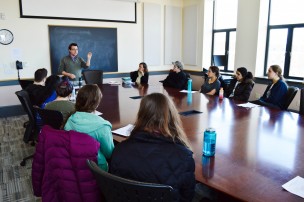On Saturday, Feb. 8, The Office of Religious and Spiritual Life hosted a talk entitled “Desire and Relationship: What’s Love Got to Do With It” that presented students with a number of different ideas surrounding love in its traditional and untraditional forms. University Protestant Chaplain Tracy Mehr-Muska, along with other members of the Office of Religious and Spiritual Life, helped organize the workshop.
“We were pleased with the turnout and impressed, as we consistently are, with the participation and personal investment of emotional energy of the students who attended,” Mehr-Muska wrote in an email to The Argus.
Director of Religious and Spiritual Life and University Jewish Chaplain David Teva said the theme was chosen in an effort to include the entire University community.
“Our challenge was to come up with something that would appeal to the broader Wesleyan campus,” Teva said. “Many of the chaplains felt that love was a theme that is rarely discussed with any depth on campus.”
The event opened with an introduction by Teva and a catered Mikado lunch. Teva played a clip from the animated film “Frozen” to prepare the audience for the following discussions. Attendees were then asked to share with each other a time when they could remember feeling particularly loved.
After some discussion, the group separated into smaller groups, selecting and attending the workshops that appealed to them. The first group of workshops included “The Secret of Love,” “Loving Your Work,” and “What Does it Take To Say ‘I Love You?’”
In these small groups, people got the opportunity to get to know each other in a more intimate setting while discussing personal experiences, opinions, and values. Some of these groups were more discussion based while some were more information driven. After 50 minutes, the groups changed and students chose a different workshop. The second round of options included workshops such as “Love and the Arts” and “The Mysticism of Love.”
The small group sessions, led by members of the Office of Religious and Spiritual Life and the Career Center, addressed some issues very rarely associated with the idea of love as we know it, such as career choice. The subject of how to love your work was treated with equal emphasis as more the general idea of love. After the workshops were completed, the group reconvened for a larger group discussion and closing remarks.
Some students had a romantic reason for attending the session.
“[I want to] re-explore myself as a single person,” an anonymous student said. “TV shows and movies give us false ideas about love.”
Other attendees had intentions of learning about love and relationships from more spiritual, intellectual, or practical points of view. Whatever their personal reasons may have been, the Chaplains found that the topic was an important one for University-age students to engage in.
“College can be a time when many students form strong relationships with others,” Teva said. “Many students approach us Chaplains seeking guidance or perspective. Many students do not see their parents’ relationships as a role model for the relationships they want to be in. Our thinking was, why not proactively address something so essential to the human condition?”
Although the Office of Religious and Spiritual Life sponsored the event, it was open to students of all faiths and religious backgrounds. Many people were not even aware it was hosted by the Chaplains before they arrived.
The Chaplains stressed that a student does not have to be religious in order to visit their offices or talk to them.
“The Chaplains in [the] Office of Religious and Spiritual Life are available to accompany people as they explore spiritual issues such as love, the purpose of life, their potential vocations, relationships, self-identity, and more, and we do not feel compelled to use religious language or operate from our personal religious paradigms in order to support people exploring these deep issues,” Mehr-Muska wrote.
The variety of the topics discussed at “Desire and Relationship: What’s Love Got to Do With It” gave participants the opportunity to ruminate on the idea that love extends beyond just this Valentine’s week.
